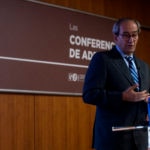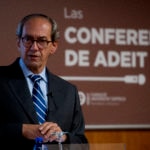José Manuel González-Páramo: "European institutions need more transparency and narrative about Europe"
The recent elections in Germany have ended this year’s electoral cycle in Europe. With euroscepticism weighing in at the ballot box, it’s now up to the European Union to bring its institutions closer to the continent’s citizens, according to José Manuel González-Paramo, Executive Director of BBVA, speaking at a conference on “The New Europe: Challenges and Opportunities” organized by ADEIT.

José Manuel González-Páramo said it’s necessary for the decision-making processes in the EU to be carried out with the greatest transparency and with suitable communication. "European institutions need more transparency and narrative about Europe", he said. In his speech in Valencia, BBVA's Executive Director has pointed out that, after two years in which “Europe has been put to the test, we have the opportunity to advance towards a greater European integration.” However, he said, it´s to ask the question, “What Europe do we want?” In González-Páramo’s opinion, the key is that the countries that comprise the European Union confront the current challenges with a common effort to regain the public´s confidence.
Europe has been put to the test, we have the opportunity to advance towards a greater European integration”
The European authorities should also address a series of concerns that have arisen among its citizens, in his point of view. Among these are border security, defense, globalization and climate change. In this regard, he considers essential to explain that globalization is positive. For this reason, he argues that the EU has to continue promoting commercial accords with the world’s largest markets, while protecting strategic sectors of its economy, and its citizens.
Likewise, he drew attention to “the economic and social inequality gap between states.” These differences, he explained, hinder economic management and balanced growth in the euro zone and agreement on common interests in Europe.”

BBVA Executive Board Director, José Manuel González-Páramo - José Jordán
Electoral year
BBVA’s Executive Board Director recalled that the year 2017 has been very intense, because in key countries, Holland, France and Germany (three of the six founding countries of the EU), there is a real threat that parties with ideals contrary to European Community principles could hold politically important posts. But euroscepticism is only one of the internal risks the continent faces. To it must be added immigration and Brexit, all against a background of political fragility in the European Community itself.
However, González-Páramo said that in recent months, "the situation has changed for the better." Apart from election results that favor Europeanism, the EC has faced the Brexit negotiations with a united front and the European Court of Justice has ruled in favor of a just distribution of refugees among its member states. Above all, the most important EC countries, among them Spain, are working with renewed vigor to raise the level of European integration.
“Europe is relatively more optimistic than it was a few months ago,” he said. As a result, there is “a window of opportunity for facing the challenges that remain to advancing towards a greater European integration.” However, “Now, we have to ask ourselves what Europe we want to have.”
Europe is relatively more optimistic than it was a few months ago. There is a window of opportunity for facing the challenges that remain to advancing towards a greater European integration"
The Old Continent also faces institutional challenges. From the economic point of view, González-Páramo considers it essential to strengthen the Economic and Monetary Union, and to complement the Banking Union with a deposit guarantee fund, while progressing with the Capital Markets Union and advancing towards a Fiscal Union.
As for the configuration of the EU in the next decade, the BBVA executive said a possible solution would be the establishment of a Europe “at two or more speeds.” This layered integration would see the EU united in matters of security, defense, external borders and migration, while in the eurozone, there would also be fiscal and political integration.
Whatever the formula that is finally chosen, “the key is that all the member states work within the EU institutions, in spite of the existence of different degrees of integration.” And, in the wake of the recent economic crisis, “it´s necessary now to strengthen the institutional and legal framework, in order to build a more united and resilient Europe to face the challenges of the future.”